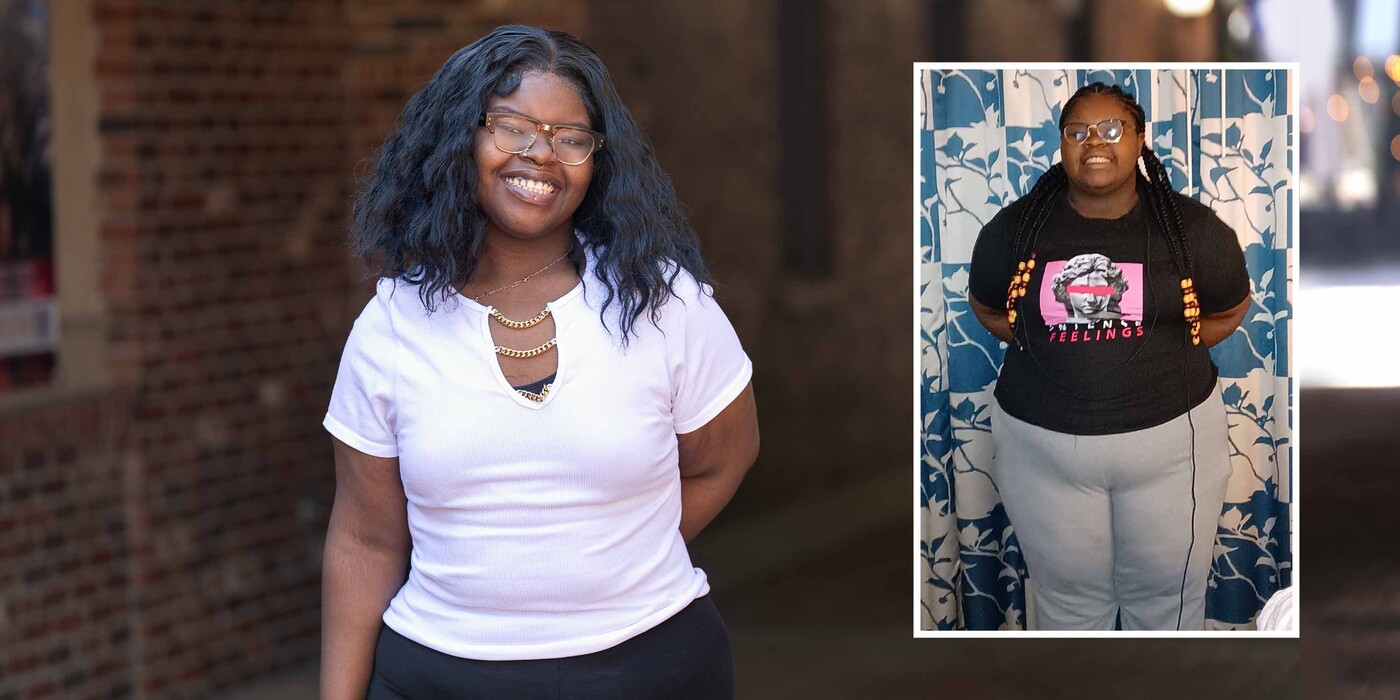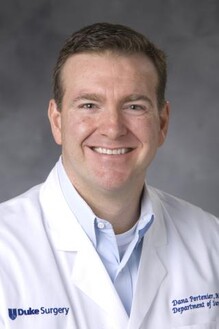Gastric Sleeve Helps Teen Overcome Obesity and Get Her Life Back on Track

J'Asia Harrington smiles in downtown Fayetteville, March 2024. Inset, J'Asia the day of her weight loss surgery, October, 2021.
J’Asia Harrington was overweight as a little girl, but her weight ballooned when she entered her teen years. By the time she was 14 years old, she weighed 362 pounds. Two years ago, the Fayetteville teen had weight loss surgery at Duke Health. Now, 18, she weighs 225 and continues to lose weight. “It was a hard, long journey, but it was worth it,” she said.
Finding Duke Healthy Lifestyles Program
J’Asia ran track and field in middle school, she tried fad diets, and obesity medications. She lost 30 pounds, but the weight came right back. Then COVID hit and J’Asia gained 100 pounds. She was depressed, insulin-resistant, and had high blood pressure. "I wanted help,” she said.
Teshia McMillian could see her daughter was miserable. She looked for a solution and found the Duke Healthy Lifestyle program, one of the nation's largest medically supervised, comprehensive weight loss programs. Its team of pediatricians, dietitians, mental health counselors, and physical therapists care for children and adolescents who have a body mass index (BMI) at or above the 95th percentile for their age. Their tailored treatments encourage positive lifestyle habits. They also recommend weight loss medications and specialized diets to support healthy weight loss.
When Weight Loss Diets and Medications Don’t Work
"Everything J’Asia did seemed to go against her,” Teshia said. “She tried the pills. At one point it worked, but it stopped. You could tell the more she tried, the more the weight loss didn’t happen. Her doctors could see her trauma. They were like she’s pushing; she’s dieting, she’s exercising. She did everything they required her to do and could see that nothing was working. That’s when they recommended weight loss surgery.”
Bariatric surgery is recommended to adolescents after a thorough assessment ensures it's the approach. “The team works with them on behavioral and medicine interventions to obtain good weight loss first,” said Dana Portenier, MD, a bariatric surgeon at Duke. “We want to make sure they have a reasonable degree of compliance, and that all the social aspects are in place for them to be successful with surgery."
At first, Teshia didn’t know if that was the right approach for her daughter. “I was hesitant because she was 15,” she said. When J’Asia begged her to learn more about it, Teshia agreed. At a parent meeting with the bariatric surgery team, “they assured me everything would be ok. I could see her face light up and the hope it gave her. That’s why I agreed for her to have it done.”
Gastric Sleeve Removes 80 Percent of the Stomach
On October 21, 2021, J’Asia underwent a sleeve gastrectomy, or gastric sleeve for short. Dr. Portenier removed up to 80% of her stomach and formed the remaining part of her stomach into a tube that resembles a sleeve. A smaller stomach reduces the amount of food she can eat and drink. The procedure also suppresses the hormones that affect appetite. The combination results in significant weight loss.
“As a bariatric surgeon, I think about lifelong treatment for my patients,” said Dr. Portenier, explaining why he recommended the gastric bypass procedure for J’Asia. “Teenagers have a lot of tough years ahead of them. Compliance may not hold. We know that obesity is a chronic, progressive disease that has a high relapse rate. I want to keep as many options open down the line. With the gastric sleeve, you can add weight loss medications to continue to lose weight. If people struggle over time, we can convert the procedure to a duodenal switch or gastric bypass.”
Learning to Adjust After Weight Loss Surgery
J’Asia recently graduated from high school and is planning her future. She is no longer insulin-resistant, and her blood pressure is normal. “Before, everything was about her weight, Teshia said. “She struggled with school. Now she has self-confidence. She is doing awesome.”
J’Asia continues to work with the Healthy Lifestyle program to achieve her weight loss goal of 190. She plans to pursue a nursing career as obesity and diabetes run in her family. She talks to her brother and father about her experience because they are considering weight loss surgery too. She’s honest with them. “You have to have the right mindset,” she said. “And you have to have dedication.”


